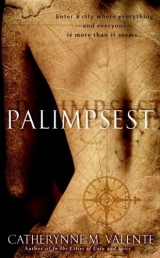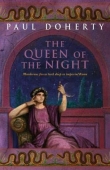
Текст книги "Palimpsest"
Автор книги: Catherynne M. Valente
Жанр:
Классическое фэнтези
сообщить о нарушении
Текущая страница: 15 (всего у книги 19 страниц)
Years hence, the ladies with their lionskins may come across a lovely young woman with a fiercely inquisitive young man on her arm, and she may notice that they never cease to touch one another in small ways, even as she chooses oranges and he squeezes quinces in the market. And she may ask: Is this my child?But it is not for her to know, and in such a manner no one family rules Palimpsest for long.
_______
Save Casimira, always save her.
_______
There is a cat asleep in the bull’s bronze mouth. Its paws flop over the hoop of the ring thrust through his flaring nostrils. November scratches its ears; it yawns. Her fingers still tingle with the bees’ exhalations; she wonders if she will ever get used to the feeling of it, of being possessed of a million arms which may reach out to anything. She pauses and listens within herself—but the bees are still in drunken celebration of her coronation and have nothing useful for her. A girl is dancing Cossack-style for coins on Zarzaparrilla Street. An old man has died of drink in the doorway of a bookshop on Vituperation and 9th. Nothing she cares for or can use. Instead, November considers the names: Oleg Sadakov. Amaya Sei. Ludovico Conti.She whispers them, like little rosaries. She almost thinks she knows what to do.
November holds up her hand; her skin is a mass of stings and welts, little ropes of hardened skin where venom flew fast through her veins. But she smiles—the wounds make a kind of map of her known world, circumnavigated by pain and need, an echo of the black lines on her face. She will never be clean again, or walk without wincing, but the joy of the bees of Palimpsest shrieks in her.
St. Folquet, presumably, stares at her from the face of his building—a tall statue of polished red wood, its features half-eaten by wood lice, the thin, imperious saint holding in one hand a divining rod and in the other a cello bow. At his feet infant bears rock on their haunches, regarding him with ursine awe and adoration.
Though deep in the city, the street is empty—November can see nothing but the long canyons made by buildings stretching up into the heavens, so far, so high that the moon is hidden. The sky seems to have given up a silent battle against the city and surrendered its heights to concrete and marble. But yes, there it is, she had known it would come for her: a carriage sliding up its slick tracks and small, surely green-shod feet stepping toward her, a hand slipping into hers. She knows the weight of Casimira’s hand by now and enjoys it. It is familiar, kind, like sinking into warm water, to be held thus.
“Would you like to go in?” Casimira says brightly. “I donate a great deal toward the upkeep of St. Folquet’s; I am sure we would be welcome. The new graduates will be having their last meal.”
“Did you graduate from this place?”
Casimira smiles in her secret way. “Don’t be ridiculous. Though,” she pauses thoughtfully, “Aloysius did, you know.”
“Then why donate so much?”
“It can only benefit the city to have endless waves of exceptionally capable, even brilliant, folk unfettered by class and family connections. They change the world once a generation. That is certainly worth something.”
The two women pass under the knowing gaze of St. Folquet and into a grand hall filled with tables, which are draped in black linen and spattered with empty plates, starkly white against the tablecloths. The professors, when they finally sight Casimira, draw up to their full height and smooth the wrinkles from their stern and byzantine clothing, which to November is a blur of suit tails, high boots, corsetry, epaulettes, and dashing capes. The women have partridge feathers in their hair, the men have crow. They encourage the students to stand, and though the Brauria are awkward, shy of their new faces, their new voices, they rise as one and applaud Casimira, their benefactress, their mistress.
She demurs, too far above them to need their praise, and leads November to a long bench like one found at a monk’s mess hall. A young man moves aside to allow her access, blushing beneath exquisite features. He clutches the arm of a radiant young woman, whose gaze is appraising and steady. She does not blush at all.
“Casimira,” November says quietly, so that they will not be overheard as the suddenly loquacious children laugh and tell old jokes which are for them raw and new. “When will I feel like myself again? I feel all the time as though I am about to fall into a great depth, and my blood is always singing, singing as though the world is ending. So many voices, all those bees—I know all their names! How can I know all their names?”
Casimira turns to her in frank joy, and her face in that moment is so full of surprise and sisterly recognition, of relief in the presence of a compatriot, that November does not suppress the need to touch her: she presses her cheek to the matriarch’s and kisses her roughly, a savagery which may only exist between queens. The children around them exchange grins and stare—they have not yet learned not to stare.
“Never, poor girl,” Casimira says when they part, and her eyes are full of tears. “You are like me now, the only one like me. It will never stop, and you will know all their children’s names, too. And the names of everyone they touch, everyone they sting, for they will not be able to wait to tell you, to report to you all they know, to make you proud of them. You must be gentle, for they are tender-hearted as you and I cannot be. You have their stewardship, and it is a great task.” She squeezes November’s hand. “But you have me, and I have you, now. And we shall not either of us be alone again.”
A great bell sounds and supper arrives—a tiny roasted finch placed on each plate, its head and beak and body intact, overflowing fig and breadcrumbs from its unfortunate mouth. The faculty and graduates draw great black napkins from beside their plates, and Casimira follows suit, smirking slyly as she lifts it and drapes it over her head. As one creature, the hall plucks the tiny birds from their plates and slips them beneath the napkin whole. November stares as two hundred people eat draped in black, as though they were witches, heads bent in prayer to worlds below their feet.
The meal goes on and on—there is no other dish, and November can hear the crunching of avian bones. She does not wish to shame them; November veils herself and takes the finch by its roasted beak, pushing it into her mouth with two fingers, her remaining blessings. It is sweet, at first, the burnished skin and meat, glazed in something like brandy and something like plum wine. But as she chews—methodically, for it fills her mouth to bursting—the organs rupture, bitter and bilious, a taste like despair, like the loss of love. And deeper, the bones shiver and crack and cut her—the taste of her blood flows in, salty as tears shed over a ruined body, mingling with the marrow, and it is sweet again, sweet as herself, herself remaining at the end of all trials.
And November can see why the veil is needed. No god should bear witness to a woman devouring a meal of herself.
She swallows what is left, finally, and lifts the veil from her face, wiping a smear of blood from her lips. Across the city, three souls clutch their bleeding mouths in shock and agony. The hall is empty; they have all gone, and only Casimira remains at her side.
“Are you ready to go home?” she says. And November is.
_______
The house is hiding behind a column when they arrive, dressed as beautifully as November can imagine a boy dressing, in turquoise silk with a wide white collar and pink satin slippers, his belt buckle ivory, his hair combed to brilliance. He has made himself special for them, but he is bashful now, and November kneels, holding her arms out to the boy. In her, the bees dance: Mother, oh, Mother and Wife, stay with us, this is your home!
She holds tightly to herself—she is so spread out now, there must be a list of all the things she is that are not herself. But at the bottom of her heart, she is still November, still the child of a librarian and a woman who caught a shark when she meant to catch a little fish, and she smiles at the boy encouragingly.
My dress; my sail.
He flies to her, his arms small and tight around her neck. Casimira watches them like a satisfied brood hen.
“I have another gift for you, November. A secret in a story. Not so important as the first. Yet it is my hope that in time it will become as vital that you know it.” Casimira sits down on the floor in the center of her hall, and the house climbs up into her lap, kissing her cheek with a loud smack.
“I was born as the children of St. Folquet are born, you must have guessed. It is not possible that I should be otherwise, as our family has within it more wealth than Palimpsest can imagine. We have long thrived on adoption, but my mother could not give me up. The brothers and sisters of that school are not alone in their skill.
“The story they tell of how I came to be in possession of my house is ridiculous—when I was eight years old I was blank as a page, and my mother had to lift my hand to the door knocker, as I could not even do that of my own will. I stood dumbly and mutely in this very hall for a week, neither eating nor moving, so stupid are the unmolded Brauria. Finally the house overcame his shyness and cared for me, as best he knew. He taught me all the languages a house can know, and all the calculations required for its construction, and all the dancing performed and poetry recited upon its floors. It was a good education. And though I cannot think how he came to imagine such a thing, one day he set about licking me into shape, with the smallest tongue and the greatest patience.”
“I talked to the other houses,” the boy says shyly, hiding his face in Casimira’s arm. “They knew where the rich little boys and girls went, and St. Folquet’s School, the school itself, you know, the building, she knows how to wake them up.”
Casimira strokes his hair like a fond cat’s. “I woke up under his mouth, and we have never separated since. That is often the way of it, I understand. And so I alone of my family was able to be both born and live as Casimira, to take my place at the center of the factory and open my ears to all of the small things made in my vats and presses. I daresay I am better at it than any Casimira before me, for I was educated by a house, and this has taught me to think strange enough things to tolerate the secret dreams of the ants in my heart.”
November traces circles on the polished cedar floor. “I thank you for the secret, and for . . . for the bees, but I can’t think why I should ever need to know this,” she said.
Casimira holds her house to her, his fingers tangled up in her long, green hair. Her voice is thick and hard when she speaks, and November understands by now that this means the great lady does not wish her to know that her words mean worlds to her.
“So that you will know, my love. So that you will know that you can be happy here with me. That you can live. That you can have a child in my house and it will not be taken from you. That I was given grace, and you may have it also. So that you will stay until you are old, and close your eyes with me, listening to all our bees and rats and starlings dream, and you will lose nothing by it.”
“Your love is a terrible thing,” November says. “It sits heavy. It stings. It cuts.”
She shrugs. “I am Casimira.”
“I don’t know if I can bear it.”
“I would not have chosen you if you could not. You will get stronger. You will grow calluses.”
The house crawls over to her, his eyes bright blue and as dashing as he can make them. “I will lick your babies alive, I promise,” he says. The love of this one, this small thing inside a big thing, that she can bear. November holds him and rocks him, and she can feel in his little body, which is not exactly flesh, and not exactly plaster, that whatever comprises his heart is thundering in exultation.
“There is a man here,” he whispers finally, as though he does not wish to admit it, to interrupt his time with this new and wonderful toy he has found. “He is waiting for you.”
November starts. She looks at Casimira with alarm—she has had no warning from the bee-minds that hover around hers.
“I think,” Casimira laughs, “they wanted to make you a surprise. They can be like that.”
The boy frowns. “He cannot come in, mistress. He is not allowed. The bees brought him as far as they could, but he is . . . stuck. In the back, on Shuttlecock Street.”
The trio make their way through the yawning lower floor of the house, and November’s heart hammers against her ribs, intent on creating some new chamber for itself. She closes her eyes and tries to feel him, as she has so many times, but the bees drown out his presence with their pleas that she be proud of them. She is proud, so very proud, and she calms them with her heartbeat. They buzz sleepily, content. She is ready. They have done as she asked. She has earned the secret Clara longs for, and Xiaohui, and her nameless brother, and the green-coated stranger. Not from a book or from guessing, but by bearing up under venom like love. Would she tell Clara? Would she open up to that poor redheaded girl, like a friend, like a lover? To Xiaohui?
She would not. November knew she would not. Because it is a sacred place, she thinks. I owe it, I owe it protection. I owe it my soul.And perhaps she ought to feel guilty for this less than honorable intent, but she does not.
And there is a man, at the great window behind the house. He cannot even quite get to the window, the lineaments of his permitted transience appear to be the borders of the broad avenue behind Casimira’s enormous house. He tries to push toward it, but he has not known a girl named Clara with a piercing in her tongue, and the amber shadows push back. He is forty or so, his curly hair thinning lightly, a long, pointed nose holding up old-fashioned spectacles. His clothes are wrinkled and plain, his eyes mild and watery.
November throws open the window.
“You can’t!” the house cries. And it is true, the golden half-mist will not let her climb out, resisting gently, even apologetically, but resisting nonetheless. She closes her eyes. The bees trumpet triumph with a million horns. She makes a guess and cries out:
“Ludovico!”
He starts, stares boggle-eyed at her, at her dress, at her ruined, blistered, vaguely glowing skin, so full of poison and honey. A vague expression of recognition crosses his shy face. But November stands in her surety, and she smiles though it hurts so much, blisters stretching and tearing on her face.
“Ludovico,” she says calmly, boldly, the deep hum of the hive in her voice. “My name is November Aguilar. I live in Benicia, which is in California. You have to find me.”
“What?” he finally sputters. “You’re right here.”
“Close your eyes and remember, Ludovico. Remember me. In the frog’s shop. Remember the bee sting on my face . . . well, yes, I suppose there is more than one sting now. But remember. I was there, with you, that first night. I held your hand.”
Ludovico covers his mouth with his hand. “I felt it . . . oh, God, the bees, I felt them when they did that to you . . . ”
“I’m sorry. I felt the people in the church, too. I think . . . it’s to make it easier to find each other. It doesn’t help that much, really.”
“No.” Ludovico seems to be calculating, weighing something precious in his mind. “You said California?”
“Yes! You have to find me in the real world. You have to find me.”
“I know! I mean . . . I know how this works.”
November blinks—she is stung. She had thought it was her secret. “Remember this,” she says, “don’t forget when you wake up, no matter what. Tell me where to meet you. Tell me where you live.”
He shakes his head, beset by her own bees, who float lazily, happily, around his hair in a black-gold corona. “Italy, I live in Italy. Rome.”
“Okay. Tomorrow, I’m going to call you. Give me your telephone number.”
He does, stuttering, and she repeats the numbers to herself over and over until she is sure she can remember.
“There’s something else, though. And it’s important, please, please remember.” She cocks her head, listening to the bees’ confused report. “We have to get to them, too. The next time you come, you have to find him, the other one, Oleg Sadakov. He keeps running away from the bees, but he’s . . . by the river, he’s under a black bridge with stone cockerels on either side. The bees will help you get there, it’s far, and we’re too new to have access to much of anything. That’s why you can’t come in. Unless you meet a girl with red hair called Clara. Or find Oleg. And I’ll find Amaya Sei.”
Slowly, as though speaking underwater, Ludovico says: “The one with blue hair?”
“Yes. She’s on the train, but I knew that anyway. I smelled it.”
“Yes, I did, too!”
“Ludovico, tell me where to meet you. Tell me where to go.”
He says nothing for a long time, staring at her. She thinks for a moment that he does not want to come, that he is like Clara, and does not want more than he has.
“The bees sought you out,” he says. “I don’t know what that means. But I think it means you are virtuous.”
November is laughing, her body bright, full of certainty all at once. “There is a list, Ludovico! A list of the things necessary for happiness, and the list is us! Ludovico Conti. Oleg Sadakov. Amaya Sei. November Aguilar.”
Ludovico tries to cross the street to her and is quietly repulsed by the amber air.
“Caracalla,” he says finally. “Meet me at Caracalla. I’ll remember.”
TWO
THE BUSINESS OF HUMAN PURITY
November woke laughing. She put her hand over her mouth, but the laughter would have none of it. Her hand ached—the blisters were still golden and painful, but they were not so swollen. She thought that when they had healed, she would be an entirely different color. She did not pull a brown book from the cabinet, though her hand strayed to it. She breathed deeply. It would wait. It would wait.
I am an ill-tempered and irascible child. The kind the Green Wind wants,she told herself.
November pulled her telephone from its cradle instead, and dialed the number still glowing in her head before it could fade, before she could forget. Her heart was her own again—the bees were gone, but she felt their absence lurch and sway in her. She missed them. Her tangled brown hair fell over her face, and her sheets were a disaster of folds and creases, and in the sheets was the disaster of her, fingerless, her face a nightmare, half-healed welts reddening her skin and sure to scar, but she could not feel them, could not care about them. She could not even risk breakfast before this, before this act she could not bear to delay, to risk losing the fire in her to speak through five thousand miles of wire to a sad-looking man with hair like fitful sunshine.
The phone rang on the other end, that strange European tone. A man’s voice, bleary, tired, slurry, answered.
“Ciao?”
“Ludovico, it’s me, it’s me,” she cried, laughing again, unable to stop.
“ Chi e questo?”
“November, Ludovico, it’s November Aguilar. Do you remember?”
His voice sharpened immediately, tightening into panic. “ Oh, Christo, Christo, non parlo Inglese! Sono un tal sciocco!”
Oh, God, November thought. Of course it’s easy there, of course all those people, from all those places, they have to speak to each other, somehow, it’s managed there, but here . . .
“Ludovico,” she said slowly, sure it wouldn’t help, “You said Caracalla. Caracalla. Just tell me when. Just say a day. Monday, Tuesday, Wednesday. Thursday, Friday. Saturday. Sunday. Say one.”
There was a long pause, and November thought she could feel him struggle to push himself through the telephone line as she did, under the Atlantic, with all the bony, luminous deepwater fish.
Finally, his tortured voice escaped into the ether: “ Domenica. Domenica.Sunday. Mezzogiorno. Mi dispiace.I am sorry. Sunday. Caracalla.”
_______
A plane, in the end, was as easy as a raft. November wore a green dress, though she could not decide if she meant it as a gesture aimed at distant Casimira or the nearby Green Wind, bundled against the frozen cities past the clouds. She did not see the shanties of the Six Winds outside her little submarine-small window, no spires of cirrus sunsets or broad pavilions of blue ice, but she allowed herself, considering everything, to think that perhaps they really were there, invisible, bustling, raucous. Like bees, little winds, little breezes in a great pearly hive. After all, Weckweet had been there. Must have been there. Casimira knew the name. Her father had been right. He had pulled out a card from a catalogue and—chance beyond chance—he had been right. Everything in the world had its place. Even November.
She had opened the hives that morning, and the bees had not flown out, but stayed sleepily in their droning, buzzing palaces. They would go when they pleased, they were not hers. Her bees waited for her, and she flew toward them, as fast as she could.
Of course people stared at her. The stewardess was careful not to touch her, and she was questioned as to her communicability. She had almost laughed at that, it seemed richly hilarious to her. But she was really and truly demoniac these days, her body scored with healing stings, her fingers gone, her face a swollen black mass. She kept the hood of her jacket up and smiled apologetically at the children who were jealously herded away from her. Don’t worry, she wanted to say, it’s not catching, not like that, anyway.But she remained silent.
_______
Caracalla was a bathhouse. Or had been. A stately ruin, old brick and long grass now, crumbled arches, stairs fallen into walls and mushroomy hillocks. It was on the outskirts of Rome, a city November had never seen till now, a city full of light that seemed palpable, that seemed flesh. Everything in Rome had taken on the color of that sunlight, everything was half-golden, one half or the other, a pervasive gold quietly conquering all, having learned lessons from the stones. Everything was so old, so old, torn down and rebuilt and renamed a dozen times. She had read on a tourist’s plaque that the cold, courteous marble of St. Peter’s Basilica was quarried from the old Forum, and it had made her inexplicably sad, that she had looked at the mammoth church the day before and known nothing of where it had come from, what it had been before. Cities built out of cities. All of them, built out of each other. Torn down, etched out, and built over again, without revealing a whisper of their old selves. Palimpsests. Manuscripts scratched away and rewritten, over and over. November smiled to herself, walking through the stony streets.
Sunday, as is its nature, was slow in coming, but it found her eventually, nosed her out with its beatific muzzle, and found her sitting in the seedy grass of Caracalla, waiting, her heart racing itself in circles around nothing. These walls once had pipes in them, steaming water gurgling up and down,she thought, and now they are so dry. In magnanimous retirement from the business of human purity.But November liked the idea of sitting in a place that was once covered in water. It felt permanent, peaceful. She felt she could still be cleaned here, with the grass and the stone, that they could grind anything away from her and leave her whole.
Ludovico was long in coming, or at least she felt that he was. He came walking around a crumbled red wall, looking just as he had before, an intractable reader’s bent posture, a shy man’s gait. She felt as though she had met him a thousand times already, had felt that woman’s mouth under his, had felt the paws and claws on him at the church, had heard the screams at the races. She wanted to hold her arms out to him. She ached to do it.
But Ludovico was staring. She had known he would stare. She did not look like this there, in her fine dress and her corona of bees. There, November was full of light. The venom of the bees glowed in her. Here she was just a woman in her thirties with a bad dye job and a green winter dress, her nails chewed, her fingers gone, her welts half-healed, leaving tracks across her body like premature wrinkles, like a burn victim. And her face, as though the city had struck her. She tried to smile under that stare, but she knew what she looked like, and though she had planned this so carefully, she did not think now that he would touch her.
“Hello,” he said. His accent was gnarled and barbed, and she knew in a moment he had practiced the word in a mirror all week.
He sat next to her, and the sun ringed his thin hair. He looked like a saint to her, with that golden disc behind him, such a serious face, such gentle eyes and gaunt cheeks.
They said nothing. They could not, they had no tongue between them. The air between their mouths thickened and crackled, but neither had the blades to pierce it. They sat thus, beneath the towers of brick, the old, broken city, looking at each other and saying nothing, and November felt it was ridiculous, that she had come so far, and had nothing to offer but her wounds.
And then Ludovico ducked his head a little and sought her mouth, and finding it, would not let it go. He clasped her hand in his, the wounded one, the one Clara could not look at, and he kissed her with a wolfish need, groaning into her with such force she felt she had stolen his breath.
You felt it, she thought, when all these things were done to me. Is that why you do not care?
But he already had her tight around the waist, and tears wet both their faces, water again flowing in that dried-up place, and he called her name over and over, morphed strangely in his mouth, but her name nonetheless. He suckled at her breasts like a child, and she bit his shoulder lightly, catlike, whispering his name, too, the only words they knew. The only words in the world. He lifted her against the half-wall of the old caldarium, clumsily, for an intractable reader is not a strapping man, and she winced—she had not been ready, but she did not care, and he did not. It was a virgin’s hurt; too much too soon, and she did not mind that. November tilted her face to the sky, and the sun washed her bare, washed her clean with its great old hands. His body leapt up into hers, pressing against her core as though it was the skin of a drum that he could break, and let loose such strange songs. She laughed again: there is a list of things necessary for happiness.
Ludovico cried out like a maddened sparrow when he came, as though he had broken, vanished, leaving such feathers in her, drifting slowly down to her bones.
Kausia and Ossification
AS ON THE BANKS OF MANY FAMOUS RIVERS,there is a small, dreary maritime museum on the Albumen, near where the shallows become swamps and those particular folk who own not grand ships but small, sweet boats never meant for fishing, but for flying dearly-bought scarlet sails and hoisting golden-skinned girls into the wind, store their treasured craft in the winter. In addition to the museum’s prodigious collection of prehistoric trivia and supplementary material, at least sixteen new varieties of dust were brought into being, catalogued, and annotated within its poor, sagging walls.
No traveling exhibits visit this place; the few glass cases and heavy iron frames have been here since before Oduvaldo, the current curator, began his tenure, and will be here when he passes the keys to his daughter Maud, who with her first giggling, gurgling words admonished her mother into silence. The long and distressing history of the white river is captured, boxed, and made small within this place, made to sit up and do tricks for the half-dozen or so visitors that it is proud to boast each year.
There is a photograph on the north wall—but how can it be a photograph? Yet it is, black and white, faded beyond any reasonable verisimilitude, and certainly someone spilled tea on it one hundred years ago, two hundred. Its frame is lead, hung with fishing weights in a previous curator’s attempt at festive decoration. It shows, as if from the air—but how can it? How can this angle ever have been possible in a world without airplanes, how can anyone have photographed this thing?—a broad, flattened circle on a vast, muddy plain full of twisted tamarisk trees and mammoth, antediluvian ferns. High, vicious mountains ring the savannah, and the sun is feeble between their peaks. The circle is enormous, and nothing grows within it. There are faint lines criss-crossing the circle—ah, but they must be creases, accordion folds, some crude soul must have mishandled this fragile thing! Your credulity can be stretched only so far! The lines are no more than spidery streaks where one sort of mud becomes another. But they remind you of something, of marked skin and maps. They spoke from the center of the plain like a wheel, and the center is a black space, like a hole dropping down through the earth and out again, and the tamarisks seem to lean in to peer at nothing at all.
The card beneath it, which was once handwritten, and is now neatly letter-pressed with inhabited initials and other unnecessary flourishes, reads:
The Plain of Palimpsest, Seen from a Great and Unknown Height.
There is no date. There could not possibly be a date. It is surely a fake, and not even a clever one, as photography is hardly an ancient art. Of the half-dozen annual visitors, at least four angrily accuse Oduvaldo of playing them for fools. He sits placidly in his great felt chair, crosses his mottled mule-legs, and smokes his churchwarden with satisfaction. He knows nothing of archeophotography and does not care to—the picture was in the museum when his grandfather was young, and that is enough for him.
In the glass cases various items rest on faded velvet—a primitive tattoo needle, coins of indeterminate age and vaguely Asiatic appearance, a street sign from some early local settlement, the word Thoalarge and still clear, if faded nearly to the color of the wood. And there is a remarkable variety of anchors, one artifact that comes easily to the curdled lowlands of the Albumen. There is a large and colorful mural of the great naval battle of Kausia Shallows—Casimira’s green galleons explode with oily abandon, showering the beached and wretched wooden frigates defending this very spot with a vicious rain of glistening spiders. It is garishly colored in a school of art long out of favor, but its very gaudiness lends it gravitas. There are three musket balls and five desiccated spiders, their innards smashed and molten, arranged in an elegant star-shape on a threadbare velvet pedestal below it.








